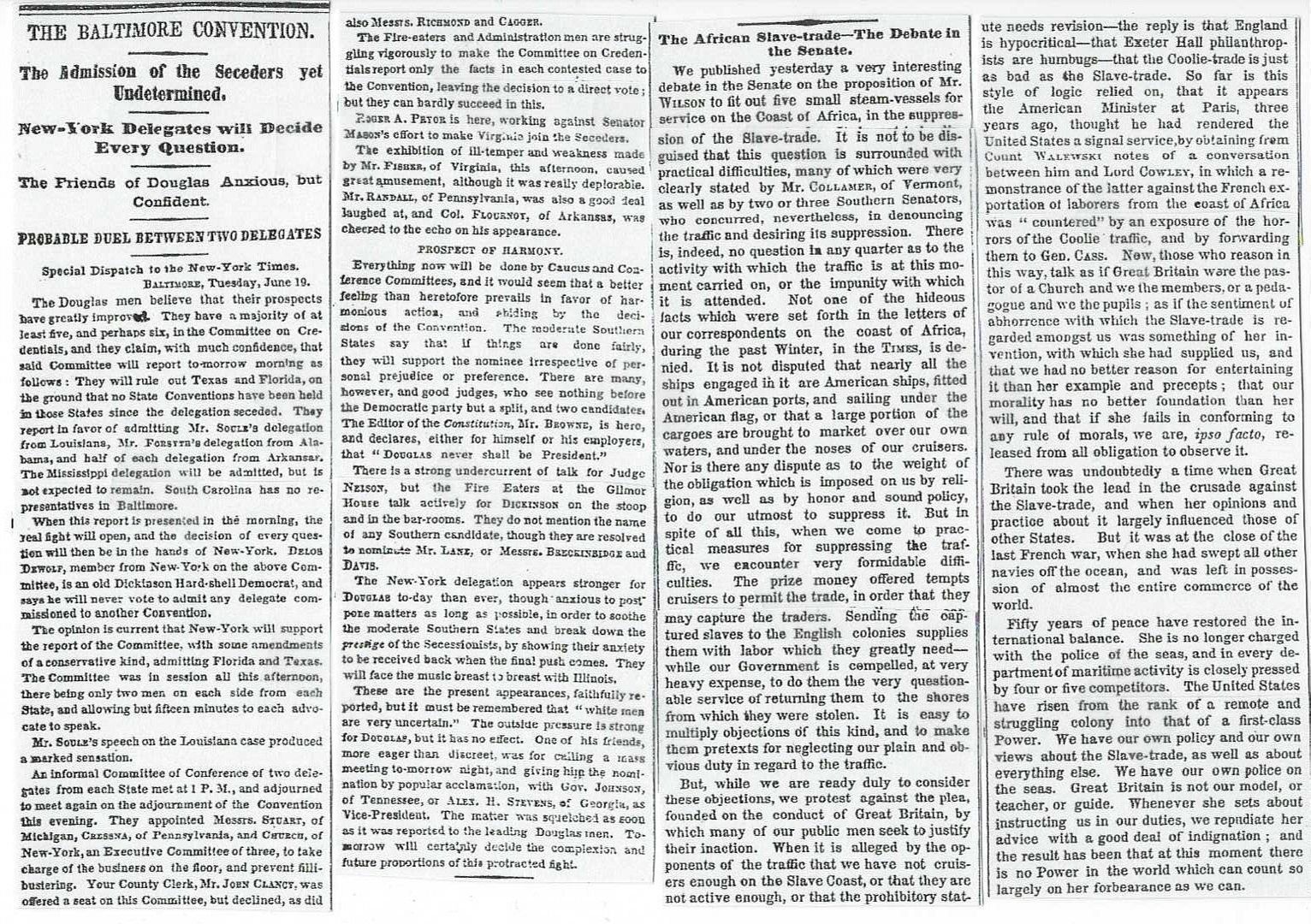


Posted on 06/20/2020 6:28:02 AM PDT by Homer_J_Simpson
Special Dispatch to the New-York Times. The Douglas men believe that their prospects have greatly improved. They have a majority of at least five, and perhaps six, in the Committee on Credentials, and they claim, with much confidence, that said Committee will report to-morrow morning as follows: They will rule out Texas and Florida, on the ground that no State Conventions have been held in those States since the delegation seceded. They report in favor of admitting Mr. SOULE's delegation from Louisiana, Mr. FORSYTH's delegation from Alabama, and half of each delegation from Arkansas. The Mississippi delegation will be admitted, but is not expected to remain. South Carolina has no representatives in Baltimore.
(Excerpt) Read more at nytimes.com ...
First session: November 21, 2015. Last date to add: Sometime in the future.
Reading: Self-assigned. Recommendations made and welcomed.
Posting history, in reverse order
To add this class to or drop it from your schedule notify Admissions and Records (Attn: Homer_J_Simpson) by reply or freepmail.
From the last paragraph on the page 2 article on the slave trade:
“The United States have risen from the rank of a remote and struggling colony into that of a first class Power”.
It’s interesting that they use the plural verb with the United States - in our lifetime, that sentence would start “The United States *has* risen . . .”
On the one hand, it could just be a residual ‘Britishism”. On the other hand the usage given does tend to emphasize some degree of sovereignty of the individual states, while our modern grammatical treatment puts the emphasis squarely on the federal union as an individual entity.
I just wonder how many years after war it was until that change in the grammatical standard took place.
In the Ken Burns Civil War documentary Shelby Foote makes that exact point. Antebellum it was the “United States are.” the war changed it to “the United States is.”
Thanks - did not know that. And not surprised somebody of the stature of Shelby Foote would pick right up on that.
[Paragraph breaks below for readability]
A Hard Case. - column 1
Another exemplification of the beauties of Slavery was given a short time since at Newport, Ky. A couple of slave hunters went to Ohio, several months ago, in search of a fugitive slave. Not finding him, they kidnapped a young negro named JAMES WAGGONER, who was born in Ohio, and whose father had been emancipated in Virginia.
The kidnappers took JAMES across the river and lodged him in Newport jail, until they could find a master for him. Here the negro lay for over six months, but no master made his appearance. At the end of that time, being unable to pay his jail fees, he was taken out and sold in order to discharge them. Guilty of no crime against Kentucky; kidnapped from his home, and forced into jail on mere suspicion of being a slave; his freedom established by the fact that no one could be found to claim him; with no means when he entered the jail, and no opportunity afforded him to earn anything while there, the State sells him into hopeless bondage for being in the very position into which she had forced him against every protestation on his part, and then sells him for being there.
Can anything be more unjust, more inhuman? Even the pro-slavery Cincinnati Enquirer is forced to admit that it is “so unjust as to shock every sense of right." And yet this is one of the inseparable concomitants of that system which that paper and its Democratic coadjutors are engaged in spreading over all the public domain of the country. Popular Sovereignty, which they support, Mr. DOUGLAS boasts exultingly, has carried the infernal system a degree and a half further north than the South ever proposed that it should go.
Office, House of Representatives, U. S., June 5, 1860 - column 4
Sir: -- I have caused the official copies of the annual reports of the Clerk of the House of Representatives of the expenditure of the Contingent Fund of the House of Representatives during the Thirtieth Congress to be examined, as requested, and do not find that at either session of Congress that there is any charge upon the Contingent Fund of the House of Representatives, or the Stationary Account thereof, of twenty-five dollars for three pairs of boots furnished the Honorable Abraham Lincoln during that Congress, as charged in the Chicago Times, of May 30th, 1860.
I am very respectfully yours,
John W. Forney
per P. Barry HayesChief Clerk, House Representatives
C. H. Ray, Esq., Chicago
Disclaimer: Opinions posted on Free Republic are those of the individual posters and do not necessarily represent the opinion of Free Republic or its management. All materials posted herein are protected by copyright law and the exemption for fair use of copyrighted works.